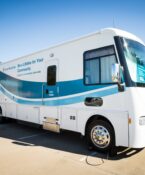An Rx for exercise
By Jeff Carlton
EXERT studyInterested in learning more about participating in this clinical trial? Eligibility Requirements:
For more information contact Kim Brown, Clinical Research Coordinator, at 817-735-2694 or brown@unthsc.edu |
Alzheimer’s disease experts at UNT Health Science Center are part of a new study that could help determine whether physicians can one day write a prescription for exercise as a way to prevent or delay memory problems.
The Health Science Center, in partnership with the YMCA of Metropolitan Fort Worth, is the only site in Texas and one of about a dozen nationally participating in the EXERT study. This national, 18-month-long clinical trial is testing whether exercise can slow the progression of early Alzheimer’s disease-related memory problems or mild cognitive impairment in adults 65 and older.
“We’ve known for a long time that physical activity can affect brain performance,” said Sid O’Bryant, PhD, Professor, Center for Alzheimer’s and Neurodegenerative Disease Research at UNTHSC. “What we’re trying to nail down is whether there’s a magic dose of exercise that would be most effective.”
More than 5 million Americans are living with Alzheimer’s, a figure that is expected to triple in the next 30 years, according to the U.S. Centers for Disease Control and Prevention. It’s the sixth-leading cause of death in the United States, and the only one among the top nine that can’t be cured, prevented or effectively slowed.
The Food and Drug Administration has approved just four medications for Alzheimer’s disease since 2000. All four treat the symptoms of the disease but do not address its basic underlying biology.
“Imagine if your doctor could write you a prescription for exercise that would help prevent memory problems,” Dr. O’Bryant said. “That’s what we’re aiming at.”
Adults between the ages of 65 and 89 and with a diagnosis of mild cognitive impairment (MCI) are eligible for the study. They must otherwise be in good health, but not already be exercising regularly.
Those who don’t have an MCI diagnosis but do have mild memory loss may be eligible for a different research project known as the Health and Aging Brain Study that examines biological and lifestyle factors that influence memory and thinking.
EXERT study participants receive a free 18-month membership to the YMCA, along with a year of free personal training. Roughly half of the participants will start an aerobic exercise program, and the other half will undergo a regimen of balance and stretching exercises, all under the supervision of a YMCA personal trainer.
“The YMCA has long promoted the value of exercise to the community,” said Lindsi Smith, Vice President, Community Wellness & Health Innovation at YMCA of Metropolitan Fort Worth. “We look forward to showing that the right amount of exercise can play a critical role in the prevention of chronic disease.”

![Uyen Sa Nguyen Scaled[58]](https://www.unthsc.edu/newsroom/wp-content/uploads/sites/16/Uyen-Sa-Nguyen-scaled58-145x175.jpg)



Social media